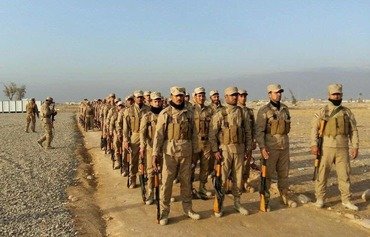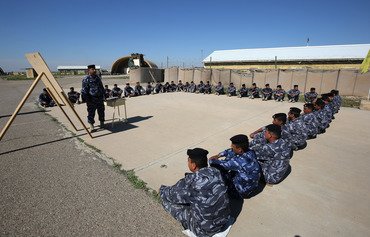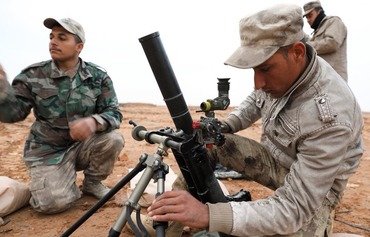The Ninawa Operations Command has begun training local fighters from the Mosul area to maintain security in parts of the province freed from the "Islamic State of Iraq and the Levant" (ISIL).
Iraqi forces have recaptured large swathes of northern and western Ninawa, including villages, districts and large desert areas, in addition to more than 40 neighbourhoods in the city of Mosul.
These areas will need local forces to help maintain security following their liberation, officials told Diyaruna, noting that tribal mobilisation forces have been holding the fort in many liberated parts of the province.
At Karah Sour displacement camp in Makhmour, south-west of Mosul, more than 300 local fighters are training to join the tribal mobilisation forces under the supervision of the Iraqi army.
Karah Sour is one of three camps, including one at al-Qayyarah military base and another in Rabiah, which train local fighters to carry out these duties, deputy Ninawa operations commander Maj. Gen. Karim al-Shuwaili told Diyaruna.
The training lasts for two weeks, he said, with the first round kicking off on December 1st.
"In the Karah Sour camp alone there are 308 trainees, with similar numbers in the other two camps," al-Shuwaili said.
Each batch of graduates is followed by another of similar size, he said, and they later join the tribal mobilisation forces to protect their areas from infiltration.
The objective "is to create a force that can hold on to the liberated land that was occupied by ISIL in Ninawa province in collaboration with the local police", he said. "This, in turn, will pave the way for the Iraqi army to complete its mission in liberating the rest of Mosul."
These forces could join and support the Iraqi army if necessary in their battles against ISIL in certain areas, al-Shuwaili said.
The training camps were set up within 72 hours, he said, as trainers were hired and training spaces were made available in collaboration with the joint special operations command and the mobilisation forces.
Local trainees of all sects
One of the trainees, Ahmed Saadoun, told Diyaruna there were volunteers at the camp from all religious and ethnic groups, including Sunnis, Shia, Christians and Yazidis , who are "united in their love for Iraq and their opposition to ISIL".
"We want nothing more than to liberate our cities and villages and to maintain stability and safety there, and for that we are ready to sacrifice our lives," he said.
At the conclusion of the training course, uniformed fighters marched in formation, carrying rifles, and took part in a shooting exercise.
The training is intensive and varied, and includes street fighting techniques as well as tactical and offensive training, Lt. Abdullah Hayawi, one of the trainers, told Diyaruna.
"All the trainees are from the province," he said. "Their response to the training was hugely positive, especially since some of them were former soldiers in the Iraqi army and have deep experience in using all kinds of weapons and fighting tactics."
"The tribal mobilisation forces need more than just training," said Sheikh Khaled al-Sabah al-Jubury, commander of the 43rd regiment of the tribal mobilisation in al-Nimrud unit, noting that they are spread across a vast geographical area.
To succeed in the fight against ISIL, they also need more military support, he said, adding that tribal forces will not surrender their positions to ISIL and will not allow the group to return to areas from which it was expelled.

![Iraqi soldiers receive training. Iraqi forces also have been training local fighters to assist them in maintaining security in liberated areas. [Photo courtesy of the Iraqi Ministry of Defence]](/cnmi_di/images/2017/01/03/6942-Iraq-training-soldiers-600_384.jpg)






